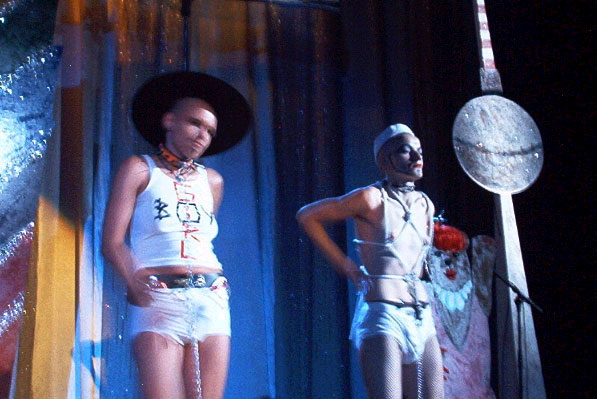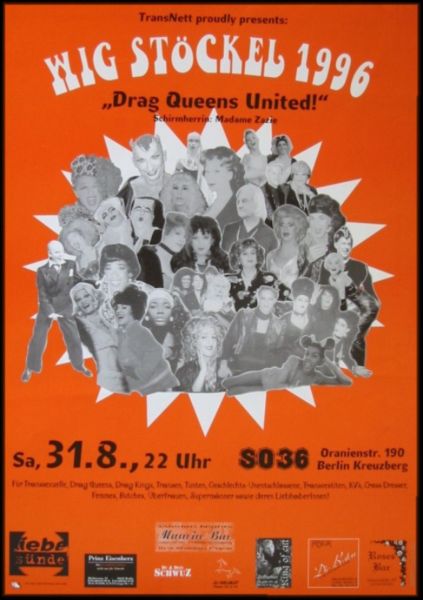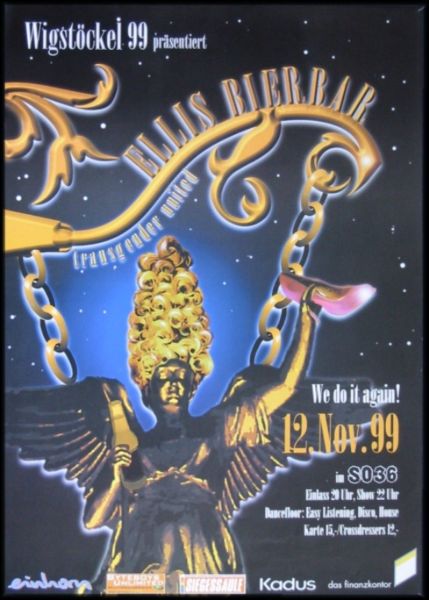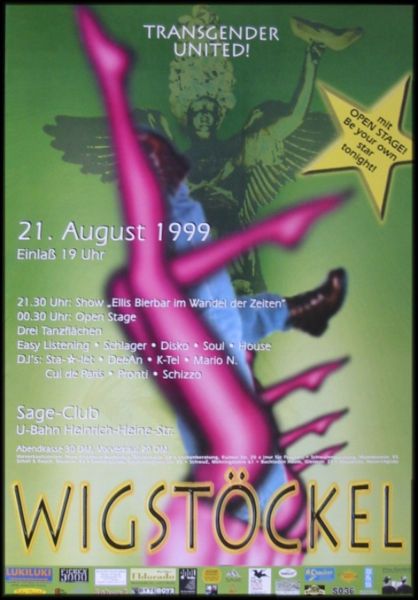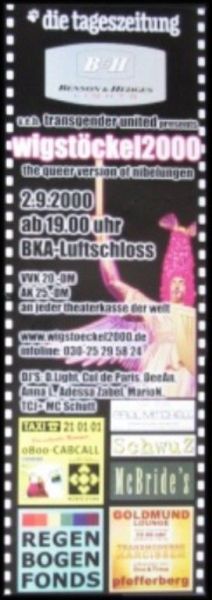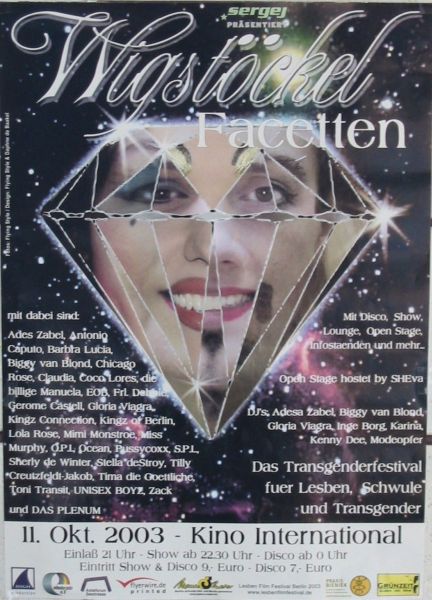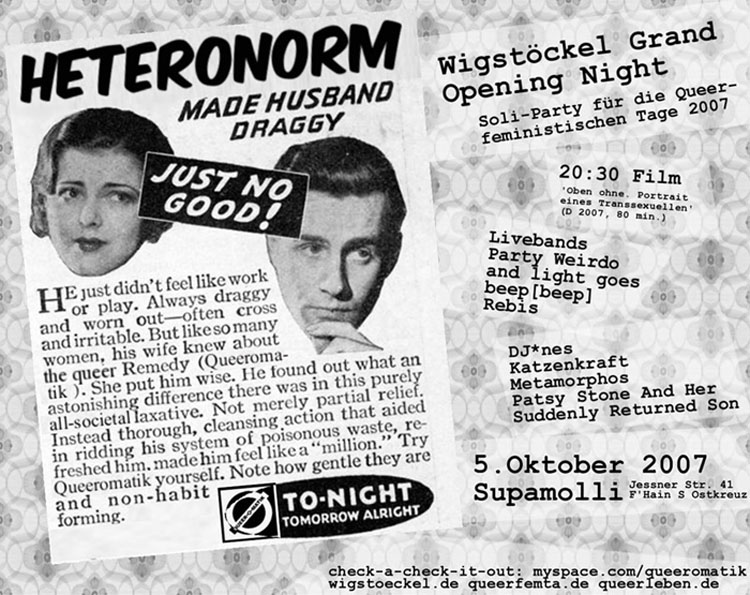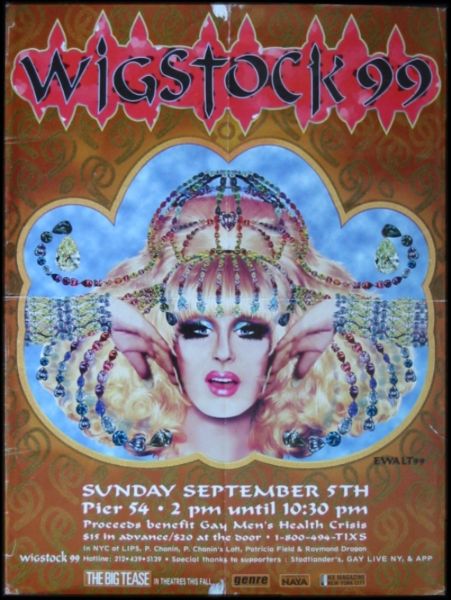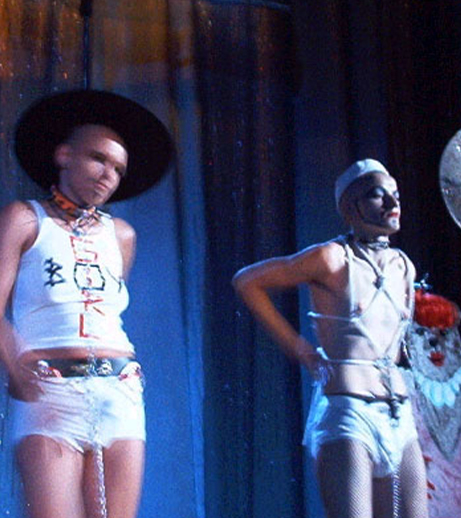Weiterziehen ✨
moving on
Akt7: The many footprints of Wigstöckel
Akt7: Die zahlreichen Spuren von Wigstöckel
In Anlehnung an Wigstock, dem legendären Drag Festival in New York City, brachte Gérôme Castell Wigstöckel nach Berlin. Was als Bühnenshow begann, wurde im Laufe der Jahre zu einem Festival, Community Event und zur Begegnungsstätte: Organisiert als Verein von Trans*- und nicht-binären Personen für Trans*- und nicht-binäre Personen entwickelte sich Wigstöckel stets weiter und beehrte ab 1996 als jährliches Festivalformat viele queere Locations Berlins; dazu zählten das SO36, das Kino International, der Südblock am Kottbusser Tor und das ehemalige SchwuZ am Mehringdamm. 2016 fand aufgrund Personalmangels das letzte Wigstöckel statt. Im Hörbild spricht die ehemalige Wigstöckel-Mitorganisatorin Kaey über 20 Jahre Diversität, Inklusion und lebhafte Diskussionen. Joey Juschka, ehemalige*r Wigstöckel Dragking Performer*in und Teil der Gruppe Unisexboys, erinnert sich an unvergessliche Bühnenmomente im Kino International und den Spagat zwischen großer Produktion und queerer Selsbtorganistion.
Following in the footsteps of Wigstock, the legendary drag festival in New York City, brings Gérôme Castell Wigstöckel to Berlin. What started as a stage show became a festival, community event and meeting place over the years: Organized as an association of trans* and non-binary people for trans* and non-binary people, Wigstöckel constantly evolved and graced many of Berlin's queer locations such as SO36, Kino International, Südblock at Kottbusser Tor and the former SchwuZ at Mehringdamm from 1996 onwards. In 2016, the last Wigstöckel took place due to a lack of staff. In the audio portrait, former Wigstöckl co-organizer Kaey talks about 20 years of diversity, inclusion and lively discussions. Joey Juschka, former Wigstöckel Dragking performer* and part of the group Unisexboys, remembers unforgettable stage moments at Kino International and the balancing act between big production and queer self-organization.
Time: 1996-2016
Lat: 52.516897616921,
Long: 13.399735325546
Published: 06.03.2023
Audio: Deutsch
Image: Wigstoeckl im Kino International mit den Unisexboys © Filmstil Wigstöckel 2003 DVD
Directed by/Regie: Ana Bisbicus
Mit Stimmen von/With Voices: Kaey and Joey Juschka
Ausschnitte aus / Extracts from: Wigstöckel 2003 Dokumentation
Ton und Technik/Sound and Post-production : Tobias Purfürst
Audio Transkript DE
[00:00:00] Musik: Wigstöckel 2003 DVD.
Kaey [00:00:00] Das ist eine schwierige Frage, den Einfluss einzuschätzen, weil ich tatsächlich merke, dass die ganzen jungen Leute es einfach gar nicht kennen.
Kaey [00:00:17] Hallo mein Name ist Kaey. Ich bin 2001 nach Berlin gezogen, aus meiner Heimatstadt Halle an der Saale und habe viele Jahre Wigstöckel mitorganisiert. Ich habe vorhin noch mal nachgeguckt. 2003 habe ich angefangen, mit dabei zu sein.
[00:00:33] Musik: Wigstöckel 2003 DVD.
Kaey [00:00:43] Wigstöckel war ein Festival, dass wir in Berlin organisiert haben. Es hieß immer von Transgender für Transgender. Also man merkt noch ein bisschen an den Begrifflichkeiten, dass es einen Ursprung in den Neunzigern hat. Erfunden hat das unter anderem Jerome Castell, auch im Prinzip eine Transperson Drag Performerin, die damals den Film Wigstock the Movie gesehen hat. Und Wigstock ist ein großes Drag Festival, das es auch viele Jahre in Amerika gab. Das wurde in New York veranstaltet und war immer unter freiem Himmel. Und es war so ein bisschen auch natürlich ein Woodstock angelehnt und Gerome und ihre Freundinnen waren von dem Film so begeistert und von der Idee, dass man im Prinzip so eine Veranstaltung macht, in denen ganz viele Drags auftreten aus unterschiedlichen Communities und haben dann als erste Wegstrecke 1996 organisiert. Das war sogar im SO36. Dann als ich dann das erste Mal mit organisiert habe fing das so ein bisschen an, dass wir die Locations gewechselt haben. Weil das Luftschloss gab es dann irgendwann nicht mehr. Also das BKA Theater ist dann halt dieses Theater geworden, was es jetzt ist am Mehringdamm, was sehr viel kleiner ist. Und dieses Event Zelt wurde einfach eingestampft und wir mussten uns dann umgucken, was für eine Location wir machen oder nehmen werden. Und die erste Location, wo ich dabei war, war das Kino international. Und es war tatsächlich damals auch eine große Frage, ob wir es da überhaupt machen, weil das ja keine Performance Bühne ist, sondern Kino.
Kaey [00:02:13] Und haben auch ewig rum diskutiert, ob das die richtige Location ist und wie wir das umsetzen? Wir haben uns echt wahnsinnig viel Mühe gegeben. Also so ein eigenes Bühnenbild, gebaut aus Holz, das Brandenburger Tor. Und dann gab es noch so Pulte, das waren so Berlin-Teddys, an dem wir die Moderation gemacht haben. Die Teddys standen auch jahrelang in meinem Keller, weil ich mich auch davon nicht trennen konnte. Irgendwann sind wir dann SO36 gekommen, und da waren wir dann auch viele Jahre. Das war dann unsere Location.
[00:02:43] Irgendwann hat sich das auch so ein bisschen wegbewegt von dieser Idee von Transgendern für Transgender, aber hauptsächlich auch einfach, weil der Begriff sich so ein bisschen abgenutzt hat und man den auch gar nicht mehr so benutzt hat und wir dann schon auch so ein bisschen mehr aware wurden, was wir überhaupt irgendwie transportieren wollen und haben dann auch das Trans mit Sternchen irgendwie so mit als die ersten benutzt, um irgendwie das offener zu lassen wer dort auftritt und zwar auch schon vor 15 Jahren bei uns. So Diversity auch ein großes Thema. Also wen holen wir auf die Bühne gehen, wen laden wir ein? Sind da genug PoC Menschen dabei? Ist das nicht alles nur weiß? Ist das nicht alles nur Drag Queens? Sind da irgendwie auch lesbische Frauen und Drag Kings und alles dabei? Das war immer ein großes Diskussionsthema. Und einer der ausschlaggebenden Punkte war tatsächlich, dass wir irgendwann auch viel mit den Kings of Berlin zusammengearbeitet haben, also einer von den Kings of Berlin. Moritz G. war auch mit in der Orgatruppe drin und der war ja zum Beispiel auch jemand, der sehr früh auch mal gesagt hat Guckt bitte mal auf dem Ablaufplan. Das sind nur so typische Drag Queens, also schwule Männer, die irgendwie Frauen darstellen, dass es so ein bisschen geht, das nicht so, also da fehlen erst mal Drag Kings und dann sollten wir mal gucken, ob es nicht langsam auch so ein bisschen auch langweilig wird von der Art und Weise, was da so gezeigt wird.
[00:04:11] Soundausschnitt Wigstöckel 2003 DVD: klatschende Menschen.
Wigstöckel Moderation [00:04:11] Soundausschnitt Moderation in Wigstöckel 2003 DVD: Jetzt und hier wir Unisex Boys.
Joey Juschka [00:04:19] Also ich bin Joey wohn seit 99 in Berlin hab vor 20 Jahren oder so viel Dragking Performances auch gemacht und irgendwann bin ich auch nach Berlin gezogen oder da wieder nach Berlin zurückgekommen. Und da bin ich dann auf die queere Performance Szene hier gestoßen also war begeistert, dass es schon große Festivals gab mit riesigen Bühnen. Also Wigstöckel da haben wir uns beworben oder gesagt, wir würden gern auftreten. Und auf einmal war das Kino international.
[00:04:59] Soundausschnitt Wistöckel 2003 DVD: Unisexboys Performance.
Joey Juschka [00:04:59] So bin ich bei Wigstöckel gelandet. Ein bisschen aus Versehen stand dann auf dieser riesigen Bühne und hab damals so ein Duo mit manchmal Gästen gehabt, das dann zum Trio wurde. Die Unisexboys fand das auch einen tollen Namen irgendwie. Irgendwie war das Geschlecht schon immer wichtig, das nicht so ernst zu nehmen oder halt damit zu spielen. Und wir haben öfters mal Performances gemacht, wo wir auf der Bühne na ja so gevögelt haben oder uns Ohrfeigen gegeben haben, wo auch nicht immer alle damit einverstanden waren oder dachten, das ist jetzt ein bisschen zu Hardcore für uns war es einfach Spaß.
[00:05:38] Soundausschnitt Wigstöckel 2003 DVD: Unisexboys Musik im Hintergrund.
Joey Juschka [00:05:38] Ja bei den Wigstöckel bei dem ersten hatten wir alle mit. War das echt Urin? Oder weiß ich gar nicht mehr? Gefüllte Kondome in der Hose, die wir dann am Ende der Performance aufgerissen haben, mit den Zähnen aufgebissen und uns in Sektgläser gekippt. Dann haben wir es getrunken. So wahrscheinlich war es kein echter Urin. Aber genau. Ich fand es aber wichtig, dass es was anderes war, als immer nur das typische Lipsync. Also rauszugehen und den Song somit nachzusehen, sondern auch, dass es gar nicht im Vordergrund stand. Also die meisten Performances waren eher so das typische Klischee, typische Drag Queen Ding mit Fett aufbrezeln und dann halt so Lipsync machen. So.
[00:06:17] Es war super gut organisiert. Habe ich jetzt so im Kopf. Vielleicht, weil ich das gar nicht gewöhnt war, dass jemand für mich organisiert weil vorher war halt. Ich hab alles selber gemacht oder wir halt so von wegen okay, ja, wir performen aber vorher müssen wir auch den Einlass machen. Wir müssen Tickets machen, wir müssen die Bar machen, wir müssen das Licht machen und den Sound auch noch irgendwie selber Play drücken und dann auf die Bühne hechten und so tun, als hätten wir nicht play gedrückt. Und das war alles anders. Das hat jemand gemacht für mich. Das war richtig so! Uhu uhu, ich bin ein Performance King. Also es war eine total schöne Erfahrung in so ein Setting mal reinzukommen.
[00:06:56] Soundausschnitt Wigstöckel 2003 DVD: Musik Unisexboys Performance.
Kaey [00:07:11] Wigstöckel war lange Jahre halt hauptsächlich eine Show, eine Bühnenshow, zu der die Leute gekommen sind. Und wir haben uns dann irgendwann überlegt, dass wir das noch ein bisschen ausweiten wollen, also dass wir da auch so Workshops anbieten. Und fing ich an mit so einer Art Begegnungsstätte. Also bevor das losging, im SO gab es dann halt so Stände, wo Vereine und Gruppen ihr Material so anbieten konnten, man auch so Beratungsgespräche führen konnte oder Anlaufstellen finden konnte, für die Transition und so Kram.
[00:07:50] Soundausschnitt Wigtöckel 2003 DVD: Menschengeräusche.
Joey Juschka [00:08:02] Ich fand den Zuschauerraum eigentlich fast viel interessanter, weil da beim Wigstöckel jedes Jahr auch eine Galerie von Transmenschen gemacht wurde. Also Fotogalerie und auch sehr mit dem TDoR dem Trans Day of Remembrance verbunden. Also da gab es einfach Fotos von Transmenschen, die entweder verletzt oder tatsächlich ermordet wurden in dem Jahr. Und das fand ich total spannend, da einfach so eine Galerie zu haben. Ebenfalls in dem einen Jahr. Ich weiß nicht, ob das jedes Jahr war. Also nicht nur Huhu auf der Bühne und alles bunt und schick, sondern der andere Teil von Transmenschen Leben ist halt das also die beiden Spektren das sich feiern und voll geile Party machen und einen richtig schönen Abend haben. Und die Gefahr. Der Alltag also wie es halt als Transmenschen im normalen Leben, wenn halt keine Community da ist oder außerhalb der Community.
Kaey [00:08:51] Wir haben ja immer Geld genommen. An der Kasse als Eintritt. Und das haben wir eigentlich immer aufgehoben, um einen finanziellen Puffer fürs nächste Jahr zu haben. Und irgendwann haben wir auch angefangen, dass zu Spenden an wohltätige Vereine. Und um diesen ganzen Prozess einfach ein bisschen easy für uns zu machen, um Spenden abzugeben, haben wir einen gemeinnützigen Verein gegründet. Den gibt es, glaube ich, auch noch, so weit ich weiß. Und der Grund, warum Wigstöckel nicht mehr weiter organisiert wurde, war tatsächlich einfach, weil es keine neuen Leute gab. Das Orgateam wurde dann auch immer weniger, weil viele von den Leuten, die es schon so lange gemacht haben, ausgestiegen sind. Und es gab halt einfach zu wenig junges Blut, um das am Leben zu halten.
[00:09:43] Soundausschnitt Wigstöckel 2003 DVD.
Joey Juschka [00:09:43] Mich hat die Größe fasziniert an Wigstöckel, dass es tatsächlich ein riesen Gebäude oder Bühne war, dass es so viele gab, dass es so eine riesige Community gab. Ja einfach so, dass so eine Masse da war. Also ein bisschen weg von diesem Gefühl. Ja, ich bin ein kleiner Queer und ja, ich kenn vier, fünf Leute, die machen auch so komische queere Sachen wie ich hier. Und auf einmal sind das hunderte Leute und die haben eine Bühne und dürfen das. Also dürfen das nicht nur. Sie müssen sich ständig selber kämpfen, alles zu organisieren. Das hat mich fasziniert, dass es tatsächlich so viel interne Unterstützung dadurch gab für einzelne Leute, durch diese Gemeinschaft.
Wigstöckel Moderation [00:10:21] Soundausschnitt Wigstöckel 2003 DVD: Hab einfach Spaß gemacht und genießt Wigstöckel2003.
Audio Transcript EN
[00:00:00] Music: Wigstöckel 2003 DVD.
[00:00:00] It's a difficult question to assess the impact, because I actually notice that younger people simply don't even know it.
Kaey [00:00:17] Hello my name is Kaey. I moved to Berlin in 2001, from my hometown of Halle an der Saale and helped organize Wigstöckel for many years. I checked again earlier. I started taking part in 2003.
[00:00:33] Music: Wigstöckel 2003 DVD.
Kaey [00:00:43] Wigstöckel was a festival that we organized in Berlin. It was always said by transgender for transgender people. So you can tell a bit from the terminology that it has an origin in the nineties. This was invented by Jerome Castell, among others, also a transperson, drag performer who saw the movie Wigstock the Movie back then. And Wigstock is a big drag festival that was also held in America for many years. It was held in New York and was always in the open air. And it was also a bit leaned at Woodstock, of course and gerome and her friends were so impressed by the film and by the idea to have basically such an event in which lots of drags from different communities appear and then they organized Wigstöckel 1996 for the first time that was even in SO36. Then when I helped organize for the first time, it started a bit to changed locations. Because the Luftschloss did not exist anymore at some point. So the BKA Theatre then became this theatre, what it is now on Mehringdamm, which is much smaller. And this event tent was simply smashed down and we then had to look around to see what kind of location we were going to take. So the first location I was part of was Kino International. And it was actually a big question back then whether we were doing it there at all, because this is not a performance stage, but a cinema.
Kaey [00:02:13] And there we discussed for ages whether this is the right location and how we can implement it. We've really put a lot of effort into it. We build our own stage set, out of wood, the Brandenburger Tor. And then there were other desks in form of Berlin-Teddys where we moderated. The teddys also stood in my cellar for years because I couldn't say goodby to them. At some point we came to SO36, and we were there for many years. That was our location then.
Kaey [00:02:43] At some point, it also moved a bit away from this idea of transgender for transgender people, but mostly simply because the term has worn off a bit and it wasn't even used that way anymore and we then became a bit more aware of what we wanted to transport anyway and then we also used the trans with asterisks as the first to somehow leave it more open who is performing there and this even 15 years ago. So diversity became a major issue. Who do we get on stage, who do we invite? Are there enough PoC people there? Isn't it all just white? Isn't it all just drag queens? Are there any lesbian women and drag kings and others there? That was always a big topic of discussion. And one of the decisive points was actually that we also worked a lot with the Kings of Berlin at some point, i.e. one of the Kings of Berlin. Moritz G. Was also part of the organization group and he was, for example, someone who said very early on, please take a look at the schedule. These are just typical drag queens, i.e. gay men who somehow portray women that it works a bit, that's not so, so there's a lack of drag kings for now and then we should see if it doesn't slowly get a bit boring from the way that is shown there.
[00:04:11] Sound excerpt Wigstöckel 2003 DVD: clapping people.
[00:04:11] Sound excerpt presentation in Wigstöckel 2003 DVD: Here and now the unisexboys.
Joey Juschka [00:04:19] So I am Joey I've been living in Berlin since 99, I've done many dragking performances 20 years ago and at some point I also moved to Berlin or came back to Berlin there again. And that's when I came across the queer performance scene here. I was amazed that there were already big festivals with huge stages. So Wigstöckel that's where we applied or said we'd like to perform. And suddenly it was at Kino International.
[00:04:59] Sound excerpt from Wistoeckel 2003 DVD: Unisexboys performance.
Joey Juschka [00:04:59] That's how I ended up with Wigstöckel. A bit by mistake I stood on this huge stage and back then I had a duo with sometimes guests, which then became a trio. The unisexboys also thought that was a great name somehow. Somehow gender has always been important, not to take it so seriously or just to play with it. And we've often done performances where we banged on stage or slapped each other in the face, where not everyone always agreed with it or thought it was a bit too hardcore for us, for us it was just fun.
[00:05:38] Sound excerpt Wigstöckel 2003 DVD: Unisexboys music in the background.
Joey Juschka [00:05:38] At the first Wigstöckel we had. Was that really urine? Or do I not even know anymore? We had filled condoms in our pants, which we then tore open at the end of the performance, bit open with our teeth and tipped ourselves into champagne glasses. And then we drank it. So probably it wasn't real urine. Exactly, though. But I thought it was important that it was something different compared to the typical Lipsync. So go out and sing a song, but also that it wasn't in the foreground at all. Most performances were more like the typical cliché, typical dragqueen with pretzeling up and lipsync.
Joey Juschka [00:06:17] I was super well organized (Wigstöckel) I have that in my head now. Maybe because I wasn't used to someone organizing for me because. I've done everything myself or we just like that okay, yes, we're performing but we also have to open the door first. We have to make tickets, we have to make the bar, we have to turn on the light and the sound somehow press play ourselves and then pike onto the stage and pretend we hadn't pressed play. And that was all different. Someone did that for me. That was really like, uhu uhu, I'm a performance king. So it was a really nice experience to get into such a setting.
[00:06:56] Sound excerpt Wigstöckel 2003 DVD: Music Unisexboys performance.
Kaey [00:07:12] Wigstöckel was for many years, mainly a show, a stage show that people came to. And then we decided at some point that we wanted to expand this a bit, i.e. that we would also offer workshops like this. And I started with a kind of meeting place. So before it started, there were stands in the SO36 where associations and groups could offer their material in this way, you could also have consultations or find contact points for the transition and stuff like that.
[00:07:50] Sound excerpt Wigtoeckel 2003 DVD: Noise from people.
Joey Juschka [00:08:02] I actually found the auditorium almost a lot more interesting because a gallery of trans people was also created there every year at Wigstöckel. Like a photo gallery and also very connected to the TDoR the Trans Day of Remembrance. So there were photos of transpeople who were either injured or actually murdered that year. And I found this really interesting to have such a gallery there. Also in that one year. I don't know if it was every year. So not only huhu on stage and everything colorful and chic, but the other part of trans people's life, the two spectrums, the celebrating each other and having a really great party and having a really nice evening. And the danger. The everyday life, how it is like as a transperson in normal life, when there is simply no community or outside the community.
Kaey [00:08:51] We've always taken money. At the ticket office as an entrance. And we've actually always saved that in order to have a financial buffer for next year. And at some point we also started making donations to charitable associations. And to make this whole process just a bit easy for us to make donations, we have founded a non-profit association. I think it still exists, as far as I know. And the reason why Wigstöckel was no longer organized was actually simple because there were no new people. The organization team then became less and less because many of the people who had been doing it for so long dropped out. And there was simply too little young blood to keep it alive.
[00:09:43] Sound excerpt Wigstöckel 2003 DVD.
Joey Juschka [00:09:43] I was fascinated by the size of Wigstöckel, that it was actually a huge building or stage, that there were so many, that there was such a huge community. Yes, just the fact that there was such a crowd. So a bit away from that feeling. Yes, I'm a little queer and yes, I know four or five people who also do weird queer things like I do here. And suddenly there are hundreds of people and they have a stage and are allowed to do that. So that's not just allowed. They have to constantly fight for themselves to organize everything. I was fascinated by the fact that there was actually so much internal support for individual people, through this community.
[00:10:21] Sound excerpt Wigstöckel 2003 DVD: Just had fun and enjoy Wigstöckel 2003.
Material
Figuren und Stimmen/ Figures and Voices:
Kaey wurde in Halle an der Saale geboren. Im Alter von 21 zog sie nach Berlin. Hier eroberte sie die Bühnen der queeren Szene im Sturm. Sie steht hauptsächlich als Sängerin und Moderatorin auf der Bühne. Seit vielen Jahren ist sie als Transaktivistin unterwegs und organisierte Beispielsweise einen Trans* March und war beim Kreuzberger CSD und dem Festival Wigstöckel involviert. In der Berliner Community ist sie eine feste Größe, die ihre Finger fast überall im Spiel hat.
Joey Juschka Ex-Unisexboy, Autor*in, Lust-Mentor*in. Wohnt in Berlin, schreibt viel, macht Podcasts (SexSprechStunde!), FLI*T*chen Partys, Pirat*innen Porno Nächte und allerhand anderes bemerkenswertes Zeugs. Insta & TikTok @joeyjuschka, auf FB auch zu finden; klassisch www.joeyjuschka.com
Mehr infos über/more infos: www.wigstoeckel.de
